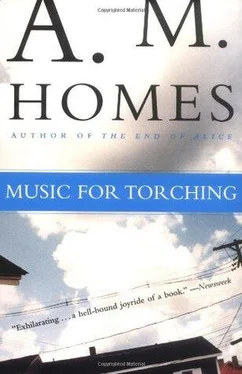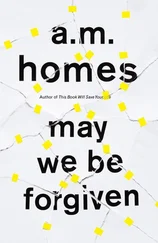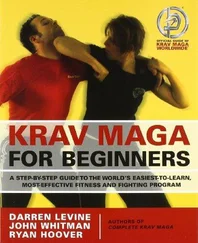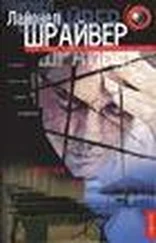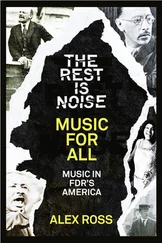room to room. Start on top and keep it very quiet, no radios, no talking. Make sure all the kids are out. Check closets and bathrooms, too. And then we're gonna need a zone out here, block it off. There's tape in the car."
"Who are you?" the cop asks Elaine.
"I'm the mother."
"Which mother?"
"Sammy's," Elaine says. "I came to pick Sammy up."
"The good boy or the bad boy?" the cop asks.
"The good boy," the teacher says.
Etherized by anxiety, Elaine's breath is light, shallow, at the top of her lungs. She is dizzy; her hands tingle.
It is morning. They are sitting at the kitchen table, eating blueberry pancakes. "Pass the syrup," Paul says. They eat breakfast, as though they've always eaten breakfast at the table together, as though it's nothing out of the ordinary. Sunlight floods the kitchen. "It's so bright in here I almost need sunglasses," Daniel says.
"It's shiny," Sammy says.
"It was a perfectly normal day," the teacher says.
The school secretary pops her trunk and takes out a pair of binoculars. "I'm a birder," she says, slightly self-conscious. "I keep them in my car." She takes a quick peek and then hands the binoculars to Elaine.
"Which window?" Elaine asks, not sure she wants to see.
"That one."
Elaine sees nothing. She adjusts the focus and sees chairs knocked over, things spilled, upset, as if people left in a hurry. There is a border of alphabet, cursive letters running around the top of the room, like decorative trim. On the blackboard is a paragraph that goes nowhere, an unfinished sentence. There is a map of the world and a globe on a stand.
"I'd like for this not to turn into a circus," the principal says, leading the cop into the school.
A yellow cab pulls into the driveway. The horn beeps. And beeps again, demanding, self-important, wrong-headed.
It's Paul.
"Elaine," he calls. "Elaine. Do you have any cash? I didn't stop for money."
She hands over her wallet.
"I'll need a receipt," Paul tells the driver. "Eighty-six seventy," he says, getting out of the car. "The whole way out I was playing a game with myself-How much would it cost? I guessed it would be about seventy-five. I gave him a hundred and ten. Was that enough? Too much? What do you think?"
Elaine can't answer-the sight of Paul drives her further in. "Nate and Sammy are in the cloakroom," she tells him, her voice flattened by the facts. "Nate has a gun. He has bulges under his clothes."
"Bulges?"
"Mysterious lumps. They're calling the Bomb Squad."
The radio crackles, and Elaine thinks of Sammy and Daniel in the backyard, the grass, the garden, the roots of trees, dirt in the Dumpster. Sammy and Daniel playing with walkie-talkies-what are you wearing? Red socks.
The younger cop is busy wrapping yellow crime scene tape around everything. It is the same kind of tape the fire department used at the house. He ties tape to the trees, the bike rack, the flagpole. He asks the passersby to take a step back, to give them some space.
Paul and Elaine stand inside the tape as though they are the thing being contained, quarantined, sealed off. They stand in the middle as though they are "it."
As much as the tape is to keep others out, to draw a line, a border, Elaine feels it is there to hold her in, to keep her corralled.
"I thought they were going to arrest us," Paul says. "I decided the whole thing-calling me at work, telling me to hurry, saying they needed us both-was a sting operation. I thought Sammy told them about the fire."
"Everything is not about you," Elaine says, raising the binoculars to her eyes, looking again.
"Can you see anything?"
"Pencils and pens. Notebook paper on the floor."
"Where would Nate get a gun?" She passes the binoculars to Paul.
"Gerald has guns," Paul says. "He goes to war camp on weekends. He shoots people with paint pellets."
"How do you know?"
"I know," he says, looking in.
Far away, there is the sound of sirens.
The top cop comes out of the school. "Let's keep this area here a quiet zone. All I want the boys to see out that window is their parents and an empty parking lot. And no radios, kill all the radios."
"My husband," Elaine says, introducing Paul.
"This isn't a holdup at 7-Eleven. It isn't like some irate employee at the post office went off. These are nine-year-olds," Paul charges.
The cop looks at Paul. He waits.
Paul tries again. "What seems to be the exact nature of the problem?"
"Last we heard, the boy had a gun aimed at your son's head," the cop says. "How well do you know the other boy? Does he have a history of mental illness?"
"We wouldn't know," Elaine says, looking at Paul.
"Any idea what could have prompted this?"
"We had a little fire at our house," Elaine says. "Sammy's been staying at Nate's."
"For how long?"
"Just this week."
"Do the boys get along?"
"They're boys," Paul offers, as though that explains it. He doesn't elaborate. He is thinking of what Sammy said that morning about Mrs. Apple moving.
"Nate kind of runs the show," Elaine says, looking at the cop. "He's not always nice."
"When was Nate mean?" Paul asks.
"I'm just saying there's some tension between them. Nate peed on Sammy the other day."
"He missed," Paul says.
"When you dropped Sammy at their house, you told me that Nate opened the door, said something crappy, and ran away," Elaine reminds Paul. "And Saturday, when Sammy came home, he said something about Nate making him do push-ups. It sounded weird, but I was tired, I didn't really pay attention," Elaine confesses to the cop. Mentally, she berates herself. She should have known something was wrong, she should have paid more attention, she should have been vigilant, ever on alert.
A television truck pulls up. Its antenna crawls into the air. The school buses start to arrive. Parents, having been notified via the telephone tree, are flocking to the school. There is a traffic jam as cars circle the block.
The secretary chases the principal around the parking lot. "You're needed at the top of the hill. They're boarding the buses, but they don't know what to do with the students whose mothers couldn't be reached. Can they send them home to empty houses?"
"There's only one of me," the principal says, throwing her arms up. "I'm doing the best I can."
"Are they handling this right?" Paul asks. "Can't they just shoot him with a tranquilizer dart?"
"This isn't Wild Kingdom," the secretary says.
In the distance, children are shouting, playing games, a ball is being tossed around. It is a perfect summer afternoon.
The Good Humor man has set up at the top of the hill. A Frisbee flies. The normalness of their behavior seems surreal, distracting, disrespectful. Elaine wants to scream, Don't you understand what is going on here? He's holding a gun to my son's head.
In a parked car, a dog barks.
She thinks of Sammy homesick in the middle of the night. Sammy in his Superman pajamas asleep on top of Paul and Elaine. Tender Sammy.
Nate's mother arrives. Elaine sees her coming. She sees her running across the parking lot toward them. And in the distance Elaine sees the cop, her cop, directing traffic. She thinks of Sammy, the cop, the red balloon.
"I was at aerobics. I got home. There was a message." She is out of breath, pink, flushed. She's still wearing her gym outfit. "I haven't showered," she says. "It was hard getting through."
"Mrs. Warshofsky?" the cop asks.
She nods.
"Apparently your son has taken another boy hostage. We believe he is armed. We need some information-are guns kept in your house?"
"My husband is a war buff," she explains.
What does that mean-a war buff? Elaine imagines asking Nate to let them change places, to let the mothers stand in. She imagines being in the cloakroom with Susan. What would they do-pull each other's hair? Elaine imagines slapping Susan, punching her, scratching her, clawing. It's all your fault, you fucking aerobic idiot.
Читать дальше
